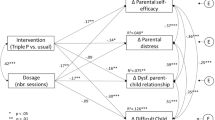Abstract
The staff role in group homes and half-way houses is psychologically demanding. Burn out and turnover are frequent; stress reactions are possible. Mental health professionals can contribute to program effectiveness and staff well-being by helping prepare persons to cope with the role stresses. Adequate preparation requires an understanding of the role experiences and their psychological implications. An initial analysis of the role is presented. The role is viewed as ambiguous, socially complex, and engendering performance fear. It requires a redefinition of the relation between work and personal life. The coping strategies of successful staff are described.
Similar content being viewed by others
References
Adams, M., & Baumbach, D. Professional parenting: A factor in group home programming.Child Care Quarterly 1980,9, 185–196.
Adler, J. In-service training for child care workers.Child Care Quarterly, 1978,7, 62–71.
Adler, J. The child care worker's leadership in group process.Child Care Quarterly, 1979,8, 196–205.
Beedell, C.Residential life with children. London: Routledge & Kegan Paul, 1970.
Beker, J., Husted, S. M., Gitelson, P. M., Kaminstein, P. K., & Adler, L. F.:Critical Incidents in Child Care, New York: Behavioral Publications, 1972.
Berry, J.Daily experiences in residential life: A study of children and their caregivers. London: Routledge & Kegan Paul, 1975.
Birnbach, D. Some observations on the dilemmas and pressures of the child care job.Child Care Quarterly, 1973,2, 87–97.
Bloom, B. A university freshman preventive intervention program Report of a pilot project.Journal of Consulting and Clinical Psychology, 1971,37, 235–242.
Braukmann, C.J., Fixsen, D.L., Kirigin, D.A., Phillips, E.A., Phillips, E.L., & Wolf, M.M.. Achievement place: The training and certification of teaching-parents. In W.S. Wood (Ed.),Issues in evaluating behavior modification. Champaign, IL: Research Press, 1976, pp. 131–152.
Borten, A.Houseparents in children's institutions. Chapel Hill: University of North Carolina Press, 1962.
Burmeister, E.The Professional Houseparent, New York: Columbia University Press, 1960.
Caplan, G.Principles of preventive psychiatry. New York: Basics Books, 1964.
Chernis, C.Staff Burnout. Beverly Hills: Sage Publications, 1980.
Freudenberger, H.J. Burn-out: Occupational hazard of the child care worker.Child Care Quarterly, 1977,6(2), 90–99.
Grossbard, H.Cottage parents: What they have to be, know, and do. New York: Child Welfare League of America, 1960.
Harrington, W., Rosenthal, S., Paul, J. & Behar, L.: The development of a technical assistance system for residential treatment programs.Child Care Quarterly 1980,9, 100–111.
Hirchbach, E. Memo to child care workers on their role in group homes.Child Care Welfare, 1976,5:681–690.
Holmes, D.S., & Houston, B. K. Effectiveness of situational redefinition and and affective isolation in coping with stress.Journal of Personality and Social Psychology, 1974,29, 212–218.
Maslach, C. Burned out.Human Behavior, 1976,5, 16–22.
Mattingly, M.A. Sources of stress and burn-out in professional child care work.Child Care Quarterly, 1977,6(2), 127–137.
Mehler, J.F. Houseparents: A vignette.Child Care Quarterly, 1979,8(3), 174–178.
Schulze, S., & Mayer, M.F. Training for house parents and kindred personnel in institutions for juvenile delinquents. InTraining personnel for work with juvenile delinquents. Washington, D.C.: U.S. Government Printing Office, 1954.
Schwartz, W. The practice of child care in residential treatment. In M.F. Mayer & A. Blum (Eds.),Healing through living: A symposium on residential treatment Springfield: Charles C. Thomas, 1971.
Author information
Authors and Affiliations
Additional information
The authors are indebted to the many group home staff who contributed to the material presented.
Rights and permissions
About this article
Cite this article
Sarata, B.P.V., Behrman, J. Group home parenting: An examination of the role. Community Ment Health J 18, 274–285 (1982). https://doi.org/10.1007/BF00754542
Issue Date:
DOI: https://doi.org/10.1007/BF00754542




